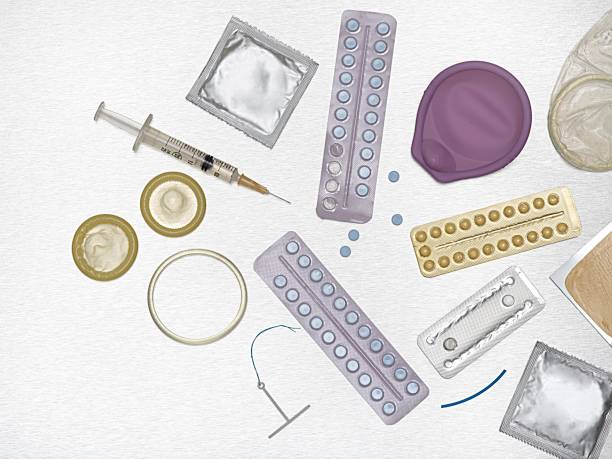
In the realm of women's health, contraception remains a pivotal topic. However, misconceptions about contraceptives often hinder effective communication and informed decision-making. BlackDoctor.org spoke with Dr. Kameelah Phillips, Organon Health Partner & Board-Certified Obstetrician/Gynecologist in private practice, who sheds light on common myths, the benefits of contraception, and how women can make informed choices in consultation with their healthcare providers.
Debunking Common Myths
Myth 1: Contraception Impacts Long-Term Fertility
One pervasive myth is that contraception negatively affects long-term fertility. However, this is not true.
“When I'm talking to people in the office about contraception, most of these individuals are of reproductive age and have plans to build their families. We discuss the reversibility of contraception. For instance, with NEXPLANON, a long-acting reversible contraception option, when we remove the device in the office, I inform them that if they're not ready to start family planning, it's important to use some type of backup contraception because a woman may get pregnant as early as a week after the removal of NEXPLANON. She should restart contraception immediately after the removal of NEXPLANON if continued contraceptive protection is desired.,” Dr. Phillips says.
Myth 2: Contraception Offers No Benefits Beyond Pregnancy Prevention
Another misconception is that contraception solely serves to prevent pregnancy. In reality, it offers numerous health benefits.
“Many people think of it strictly as family planning, but some contraception can provide great benefits such as reducing heavy bleeding, pelvic pain, acne, and endometriosis, as well as helping to reduce the risk of certain types of cancers,” Dr. Phillips adds.
Myth 3: Contraception Is Separate from Holistic Health
“There's a misconception that contraception cannot be part of a holistic lifestyle,” Dr. Phillips notes. “It often gets categorized as something separate from healthy living. However, there are ways that contraception can really help you enjoy your best life.”
RELATED: Birth Control Pill Basics Every Woman Needs to Know
Exploring Your Contraceptive Options
When it comes to choosing the right contraceptive, the decision should be tailored to your lifestyle and health needs.
“I actually throw the question back to patients: what type of person are you? Are you someone who can manage something daily, or do you prefer flexibility and not having to think about contraception much? What's your personality like? This insight helps guide our discussion,” Dr. Phillips advises.
Below, Dr. Phillips categorizes hormonal contraception based on the frequency of use and your lifestyle:
Daily, Weekly, and Monthly Methods
- Pills: Taken daily, ideal for those who can maintain a consistent routine.
- Patches: Applied weekly, offering a balance between routine and convenience.
- Shots: Administered monthly, suitable for those preferring less frequent maintenance.
Long-Acting Reversible Contraceptives (LARCs)
LARCs are also gaining popularity due to their convenience and effectiveness.
“Many people are busy with travel and various responsibilities, and the last thing they want is to focus on contraception. Long-acting contraceptives can be very convenient,” Dr. Phillips shares.
She frequently discusses options like Nexplanon and IUDs (intrauterine devices) with her patients.
Nexplanon: A small implant placed in the upper arm, effective for up to three years. It’s reversible, with quick restoration of fertility upon removal.
IUDs: Available in hormonal and copper variants, these devices are inserted into the uterus and can last from three to ten years, depending on the type.
“When we discuss long-acting contraception, it's crucial for patients to understand that these methods are reversible. For instance, Nexplanon is effective for up to three years, but it can be removed anytime if their reproductive plans change. It's a short insertion procedure done in the office, usually in the upper bicep, with local anesthesia like lidocaine to minimize discomfort. We also talk about potential changes in their bleeding patterns, managing their expectations about their periods, and emphasizing that these changes do not affect fertility. These are key points for patients to understand," Dr. Phillips notes.
"Another way I break it down is by hormone content. We talk about estrogen-containing options and progestin-only options because the latter is important for those looking to manage their risk profile. Progestin-only options include the progestin-only pill, the shot, and Nexplanon," Dr. Phillips adds.
The Importance of Regular Check-Ups
Annual visits are standard, but any concerns or changes in circumstances warrant additional consultations.
“Regarding how often women should see a healthcare provider for checkups, it varies based on the individual and their lifestyle, not necessarily their relationship status. Typically, I review contraception at annual visits. We find a method that works for her, and she goes on to live her best life. However, if there are any concerns, side effects, or lifestyle changes, it's important to check in with a healthcare provider," Dr. Phillips shares highlighting a patient who decided to switch from the pill to Nexplanon before moving to Spain to avoid dealing with pharmacies and the European health system. "Although there was nothing wrong with her current birth control, her life situation changed, and so did her contraception method,” Dr. Phillips shares.
Staying Informed and Proactive
Regularly reviewing your contraceptive options with your healthcare providers is also important. Dr. Phillips recommends using resources like birth control charts to facilitate informed discussions.
If you get to your doctor’s appointment and aren’t sure where to begin, Dr. Phillips suggests asking “What’s new?”
“When you're visiting your provider, and since we don't see each other very often, it's always helpful to review contraception. What's new? Should I change it? If it's not broken, don't fix it. How should we proceed? I think it's also helpful to ask, 'See you next year, but what should I expect over the next year or next decade?' Your 20s are absolutely different from your 30s, which are different from your 40s and 50s. I try to give my patients some anticipatory guidance on things they should be thinking about health-wise,” she suggests.
Contraceptives and reproductive health aside, your gynecologist can also help you manage your overall health and well-being.
“Gynecologists are a bit of a mix of specialties—we're a bit like internal medicine, and we're surgeons. We do a lot of things. Looking at you as a whole person is important. We should check in on your mental health—are you seeing a therapist regularly? We should check in on your blood pressure—how’s that going? How’s your cardiovascular health? What’s your workout routine looking like? Oh, I’ve been seeing you over the course of five years, and I’ve noticed you’ve gained seven pounds. What are we doing about that? Really looking at the whole person is something that people should expect to have conversations about, not just your reproductive health and private parts,” Dr. Phillips adds.
Remember, there is no one-size-fits-all when it comes to contraception. Your healthcare provider is a valuable resource for discussing new developments in contraception and finding the best options for your lifestyle.








